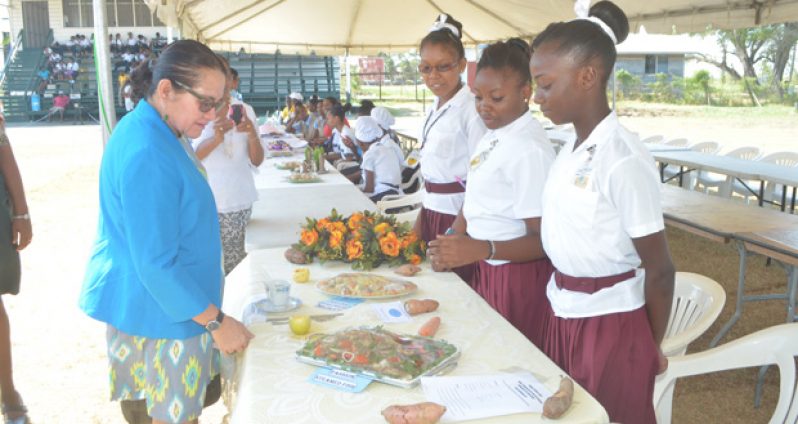-as country aims to curb increase in non-communicable diseases
By Shirley Thomas
THE call for greater emphasis to be placed on agricultural production and the consumption of locally grown foods was made at a Secondary Schools Home Economics Competition held in the city last Wednesday.

The event was organised by the Food and Agriculture Organisation (FAO) of the United Nations, and the venue was the Ministry of Education’s Ground in Carifesta Avenue, where 18 competing secondary schools proudly displayed their delectable, nutrient-rich and mouth-watering dishes prepared in keeping with the theme: “Promoting Root Crops in Guyana”.
The benefits of natural and unprocessed foods as compared to those loaded with simple sugars (as found in fast foods) were poignantly brought out in presentations delivered by patron of the competition, First Lady Mrs. Sandra Granger, who delivered the feature address and presented trophies to the winning school, North West Government Secondary.
Second and third place winners were the Beterverwagting Practical Instruction Centre and New Amsterdam Secondary School respectively. All winners were given trophies and kitchen tools to boost the preparation of dishes in their respective Home Economics Departments.
The competing schools were required to prepare dishes using root crops combined with other locally grown fruits and vegetables to come up with interesting and creative dishes. The aim was to help curb the upsurge of chronic non-communicable diseases which are linked to the types of foods consumed locally.
As specified, the dishes prepared were low in fats, high in fibre, and were full of nutrients; but essentially had as their major component unrefined or natural carbohydrates. Processed carbohydrates include white flour, white rice and refined sugars.
Participants also carefully avoided the use of trans-fats, cholesterol and excess sodium (salt), as these lead to obesity and chronic non-communicable diseases such as high blood pressure, diabetes, heart and kidney diseases, which are all rampant in Guyana at this time.
Mrs. Granger commended the efforts of the competitors and the teachers who guided and assisted them, noting that they demonstrated not only creativity, but their interest and capability in providing and promoting tasty, quality food prepared from local produce. She encouraged both the cultivation and consumption of agricultural and marine products, noting that it gives access to fresh, nutritious, wholesome produce at a price that should be more affordable than imported foodstuff.
While contending that nothing is wrong with an occasional fast food meal, she emphasised thus: “For our children to grow fit and strong, they need a steady daily diet of fresh, wholesome food.”
The First Lady reminded the students that another spin-off from the habit of eating fresh food is that it gives rise to a healthier nation, and we reduce the high local incidence of chronic non-communicable diseases.
Referring to the theme for Agriculture Month: “Social Protection and Agriculture – Breaking the cycle of rural poverty”, Mrs. Granger said the theme resonates because vulnerable sections of our population, in rural and urban areas, still struggle to make it through the day.
To this end, she conceded that agricultural production and productivity will, in particular, benefit the poor; hence it is important to produce enough and at prices that are affordable.
Looking at the bigger picture, she sees the focus on agricultural development as benefiting the nation in diverse ways, and ultimately breaking the cycle of rural poverty.
Meanwhile, FAO Representative Mr Reuben Robertson made the point that eating healthy is pivotal to our health and wellbeing.
He gave global statistics which show that 800 million people across the globe still go to bed hungry and do not have access to food. But the corollary, he said, is that food is available in some countries, for example Guyana.
“Guyana is fortunate to be self-sufficient in most foods; but pathetically, what are we seeing? We are seeing health challenges in the form of chronic-non communicable diseases such as hypertension, diabetes, stroke, heart attack, just to mention a few.”
What is important to note, he said, is that it is not just the old and middle-aged people, but the young people and school children who are coming down with these diseases.
“Therefore we recognise that eating healthy is pivotal to living a healthy lifestyle,” the FAO Representative stressed.
On a note of encouragement, Mr. Robertson told the competing schools, “I want you to reflect on this…not to see the competition [today] as just a competition to win a trophy or an award, but a competition to create the incentive and encourage other young people to become attracted to healthy and local foods.”
He recommended unrefined and natural carbohydrates, which are also high in fibre, as being very good for digestion. “And therefore we need to see the link between eating healthy and health and wellbeing,” Mr. Robinson said.
His closing message to the students was: “So when you leave here today, I really would want to encourage all of us…with the kind of creativity that I have seen, we can now start the ball rolling by using some of these creative dishes and encouraging our young people to start eating healthy.”


.jpg)











